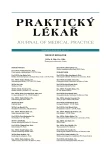Basics of social cognitive and affective neuroscience.
XXIII. Optimism
Authors:
F. Koukolík
Authors‘ workplace:
Primář: MUDr. František Koukolík DrSc
; Národní referenční laboratoř prionových chorob
; Thomayerova nemocnice, Praha
; Oddělení patologie a molekulární medicíny
Published in:
Prakt. Lék. 2012; 92(9): 487-490
Category:
Editorial
Overview
Optimism is defined both as the overestimation of the probability of pozitive future events and the underestimation of the probability of future negative events. Our assessments of our own future are often unrealistically optimistic despite the fact that we like to think of ourselves as rational creatures. Unrealistic optimism is a pervasive human trait that in a substantial number of people perhaps influences every facet of their experience and behavior. One possibility of maintaining unrealistic optimism despite the prevailing experience could be an evolutionary coded asymmetry of belief updating which has a neural correlate.
Key words:
optimism, belief updating, neural correlate
Sources
1. Addis, D.R., Wong, T.A., Schacter, D.L.: Remembering the past and imagining the future: common and distinct neural substrates during event reconstruction and elaboration. Neuropsychologia 2007; 45, p. 1363–1377.
2. Adolphs, R.: Conceptual challenges and directions for social neuroscience. Neuron 2010; 65, p. 752–767.
3. Barkow, J., Cosmides, L., Tooby, J.: The adapted mind: evolutionary psychology and generation of culture. New York: Oxford University Press, 1992.
4. Bengtsson, S.L., Dolan, R.J., Passingham, R.E.: Priming for self-esteem influences the monitoring of ones´s performance. SCAN 2011; 6, p. 417–425.
5. Bowles, S., Gintis, H.: The evolution of strong reciprocity: cooperation in heterogenous populations. Theor Popul Biol 2004; 65: p. 17–28.
6. Boyd, R., Gintis, H., Bowles, S., et al.: The evolution of altruistic punishment. Proc Natl Acad Sci USA 2003; 100: p. 3531–3535.
7. Boyd, R., Richerson, P.J.: The origin and evolution of cultures. Oxford: Oxford University Press 2005.
8. Drevets, W.C., Price, J.L, Simpson, J.R.Jr et al.: Subgenual prefrontal cortex abnormalities in mood disorders. Nature 1997; 386, p. 824–827.
9. Emory, N.J., Clayton, N.S.: Comparative social cognition. Annu Rev Psychol 2009; 60, p. 8–113.
10. Festinger, L.: A theory of cognitive dissonance. Stanford, CA: Stanford University Press, 1957.
11. Hare, T.A., Camerer, C.F., Rangel, A.: Self-control in decision-making involves modulation of the vmPFC valuation system. Science 2009; 324, p. 646–648.
12. Hauser, M.: The possibility of impossible cultures. Nature 2009; 460, p. 190–196.
13. Koukolík, F.: Já. O mozku, vědomí a sebeuvědomování. Druhé, přepracované vydání. Praha: Karolinum, 2013 (v tisku).
14. Lenartowicz, A., Verbruggen, F., Logan, G.D., et al.: Inhibition-related activations in the right interior frontal gyrus in the absence of inhibitory cues. J Cogn Neurosci 2011; 23, p. 3388–3399.
15. Lovallo, D., Kahneman, D.: Delusion of success: how optimism undermines executives´ decisions. Harv Bus Rev 2003; 56, p. 56–63.
16. Puri, M., Robinson, D.T.: Optimism and economic choice [online]. Dostupné na WWW: http://www.nber.org/papers/w11361.pdf?new_window=1.
17. Storm, B.C., Jobe, T.A.: Remembering the past and imagining the future: Examining the consequences of mental time travel on memory. Memory 2012; 20(3): p. 224–235.
18. Strunk, D.R., Lopez, H., deRubeis, R.: Depressive symptoms are associated with unrealistic negative predictions of future life events. Behav Res Ther 2006;44, p. 861–882.
19. Sharot, T., Riccardi, A.M., Raio, C.M., et al.: Neural mechanisms mediating optimism bias. Nature 2007; 450(7166): p. 102–105.
20. Sharot, T., De Martino, B., Dolan, R.J.: How choice reveals and shapes expected hedonic outcome. J Neuroscience 2009; 29, p. 3760–3765.
21. Sharot, T.: The optimism bias: A tour of the irrationally pozitive brain. New York: Pantheon/Random House, 2011.
22. Taylor, S.E., Brown, J.D.: Illusion and well-being: a social psychological perspective of mental health. Psychol Bull 1988; 103, p. 193–210.
23. Varki, A.: Human uniqueness and the denial of death. Nature 2009; 460, p. 684
24. Weinstein ND. Unrealistic optimism about future life events. J Pers Soc Psychol; 1980; 39, p. 806–820.
Labels
General practitioner for children and adolescents General practitioner for adultsArticle was published in
General Practitioner

2012 Issue 9
- Advances in the Treatment of Myasthenia Gravis on the Horizon
- Hope Awakens with Early Diagnosis of Parkinson's Disease Based on Skin Odor
- Memantine in Dementia Therapy – Current Findings and Possible Future Applications
- Memantine Eases Daily Life for Patients and Caregivers
- Possibilities of Using Metamizole in the Treatment of Acute Primary Headaches
-
All articles in this issue
-
Basics of social cognitive and affective neuroscience.
XXIII. Optimism - Primary prevention of congenital anomalies
- Acute bleeding from oesophageal varices
- Differential diagnosis of genital ulcerations
- Psychosocial care of women after perinatal death
- The needs of parents of children with cerebral palsy
- Psychological aspects of stress on medical students
- Paraneoplastic limbic encephalitis in a young male with a testicle tumour
-
Basics of social cognitive and affective neuroscience.
- General Practitioner
- Journal archive
- Current issue
- About the journal
Most read in this issue
- Differential diagnosis of genital ulcerations
- Acute bleeding from oesophageal varices
- Psychosocial care of women after perinatal death
- Psychological aspects of stress on medical students
